Michelle Cox's Blog, page 16
August 5, 2021
“He Stayed in the Picture”
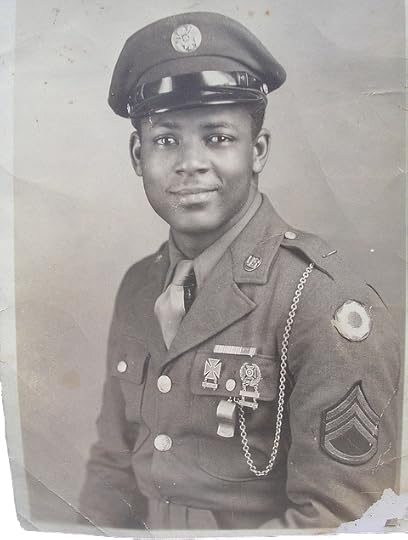 Jonathon Arthur Conrad was born on January 19, 1919 in Arkansas to Bruce “Bubba” Conrad and Marian Moore. Jonathon was apparently their only child. Bruce worked doing odd jobs, and Marian was a house wife. Jonathon graduated from high school and worked for a few years in a warehouse. He eventually married Ethyl Jones, a girl he had gone to school with. The two of them had always gotten along, but after they married, their relationship quickly soured and they divorced. When World War II broke out, Jonathon enlisted in the army and was sent to the South Pacific for most of the war.
Jonathon Arthur Conrad was born on January 19, 1919 in Arkansas to Bruce “Bubba” Conrad and Marian Moore. Jonathon was apparently their only child. Bruce worked doing odd jobs, and Marian was a house wife. Jonathon graduated from high school and worked for a few years in a warehouse. He eventually married Ethyl Jones, a girl he had gone to school with. The two of them had always gotten along, but after they married, their relationship quickly soured and they divorced. When World War II broke out, Jonathon enlisted in the army and was sent to the South Pacific for most of the war.
When he was discharged, Jonathon returned to Arkansas and thought he might try to start over with Ethyl, but he found she had already remarried. He turned his attention to work, then, and tried to find a job, but it was difficult. He found temporary things, but nothing steady. Finally, in 1957, he decided to try his luck in Chicago. He did not want to leave his mom, as he had a feeling he would never see her again, but she persuaded him to go, telling him that it was his chance for a new life.
In Chicago, Jonathon was able to find a job almost instantly as a truck driver, which he worked at for a year before getting a job at the Leif Candy Company as a janitor. At some point, Jonathon met Lula Wilson, who was quite a few years his junior, and they married. Together they had two children: Jonathon, Jr., or “Johnny,” and Cora. Jonathon and Lula were apparently very happy together at first, but then Lula began to resent the fact that Jonathon never wanted to go out. Jonathon was content to stay at home, but neither was he happy if Cora went out with girlfriends. The two began fighting often, and finally, when Johnny was thirteen and Cora eleven, Lula and Jonathon divorced.
“He wasn’t like most men, though,” says Jonathon’s daughter, Cora. “He stayed in the picture.” Jonathon paid Lula child support and took the kids to live with him in the summers. Cora said that despite her initial anger with her parents, and him in particular, she has a lot of respect now for her father for being a responsible father. When she was a teenager, she went to stay with him year-round.
According to Cora, Jonathon enjoyed pottering around the house and was always fixing something. He also loved watching westerns and riding his bike along the lake. He had a lot of friends and had a poker night at his house every Thursday for over fifteen years. One thing that Cora was shocked by, however, after going to live with her father, was how much he drank. She begged him to get help, but he refused to, so she eventually went back to live with her mother.
Once back at home with Lula, Cora found that not only was her mother suffering from an early form of arthritis, which left her unable to get around, but that she resented Cora for abandoning her to go and live with Jonathan and thus frequently lashed out at her. To make matters worse, Johnny had moved to Peoria while Cora was gone, making it all the harder for Cora. Eventually, she graduated from high school and moved out almost immediately, having grown weary of caring for her dysfunctional parents. In 1984, she got married and moved to River Forest.
In the late 1980s, Jonathon was diagnosed with mild brain damage due to his heavy drinking and smoking and found it increasingly difficult to live alone. He then decided to move to Somerset House, an apartment building for seniors on the north side, where he quit drinking and smoking cold turkey. Cora did not visit her father for almost a year, but was forced to go see him when she found out that her brother had died suddenly of a heart attack. She felt she should tell her father the bad news in person and therefore went to see him at Somerset. Jonathon was stunned by the news, and he and Cora broke down and cried together for a long, long time.
Johnathon had apparently been doing well before Johnny’s death, but after his funeral, he spiraled into grief and went back to smoking and drinking. He eventually had a stroke, several years later, and was hospitalized for several weeks. He was transferred to a nursing home, where he remains unresponsive in a semi-conscious state. Cora visits daily and insists that her father is aware of her presence and that he responds to her questions by opening and closing his eyes, but the staff have not yet been able to corroborate this.
Cora is having a very hard time accepting her dad’s condition. Lula is still alive but not physically able to visit Jonathon due to her own health issues, but has told Cora that she isn’t really interested, anyway. It has unfortunately fallen on Cora, then, to still be his only support system. At times, she brings her grandson with her, which seems to help her to cope with the situation.
(Originally written: January 1996)
If you liked this true story about the past, check out Michelle’s historical fiction/mystery series, set in the 1930s in Chicago:
The post “He Stayed in the Picture” appeared first on Michelle Cox Author.
July 29, 2021
She Married a Prisoner of War
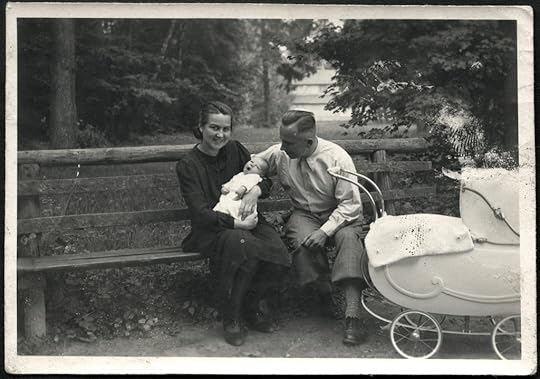 Apolena Moravec was born on June 30, 1902 in Korovyntsi, Ukraine, though Apolena refers to it as being part of Russia. Her father, Alexei Popov, was Russian, and her mother, Helena Lisiewicz, was a Pole. Alexei worked as an accountant, and Helena cared for their five children, of whom Apolena was the youngest.
Apolena Moravec was born on June 30, 1902 in Korovyntsi, Ukraine, though Apolena refers to it as being part of Russia. Her father, Alexei Popov, was Russian, and her mother, Helena Lisiewicz, was a Pole. Alexei worked as an accountant, and Helena cared for their five children, of whom Apolena was the youngest.
Apolena attended elementary and high school and was even allowed to attend a training school for two and a half years to become a teacher. Shortly after she began her first job as a new teacher, she somehow met a young prisoner of war, Dusan Moravec, in a Russian prison camp. He had been a soldier in the Austrian army during WWI and had been captured and taken to Russia.
When Dusan was eventually released, he and Apolena married and moved to Prague, where Dusan was from originally. The two set up house there, and Dusan found work as a bookkeeper. Apolena stayed home with their two children: Anna and Honza. Dusan and Apolena apparently had a very happy life together until Dusan died in 1955 at age 55 of stomach cancer.
Several years later, in 1969, Honza decided to try his luck in America to start a new life. After only about a year, he had found work in Chicago and sent for Apolena and his sister, Anna, and her family, to join him. For a while, the whole family lived in one small apartment in Broadview, Il. until they all found work and separate places to live.
Apolena found work in a day care near the apartment in Broadview, where she continued working for almost twenty years. She loved working with children and says that often she wished she could have spent more time as a teacher back when they lived in Europe. Eventually, Anna’s husband, David, was offered a better job in Springfield, Il, so they moved there. They offered to take Apolena with them, but she was reluctant to move yet again and to give up her job.
For several years, Honza lived with her until he met a woman, Donna Scheglitz, and got married. Honza was already into his fifties at this point and says he never married before because he didn’t feel financially stable enough. Sadly for Apolena, Donna wanted to move back to her hometown of Lakeside, Michigan, shortly after they were married. They, too, offered to take Apolena with them, but she was determined to stay put. After only eight years, however, Donna died.
Not long after that, Apolena fell and broke her hip. She was able to recover, but she had to quit her job, and she began to get very bored and lonely. For the first time, she regretted her decision to live on her own, so she called Honza and asked if she could come and live with him, suggesting that they might be nice company for each other in the wake of Donna’s death.
Honza agreed, though he had doubts as to how stimulating his small house and life would be for her, especially as he was still working and not home very often. When he went to get her, he was shocked, he says, by how much she had deteriorated. It wasn’t just her physical state, but her mental state had altered, too, he noticed. She was now paranoid and depressed and never wanted to be left alone, often crying whenever Honza went out. He urged her to get involved at church or the senior center nearby, but she was terrified of leaving the house. Finally, Honza suggested that perhaps she should go and live with Anna instead, who had a husband, kids and even grandkids to keep her company.
Apolena considered this, she says, but ultimately decided against it, especially as it was becoming harder and harder for her to get around. Thus, at age ninety-two, she decided she was “old” and that she should go to a nursing home rather than burden her family any more. She made the decision then to return to Chicago so that she could be admitted to a Czech nursing home. Honza drove her, and Anna came up from Springfield to help her get settled.
So far, Apolena has made a smooth transition. She loves her roommate and would be content to stay in their room all day and chat or watch TV. Still suffering to a certain extent from paranoia and fear, she rarely ventures outside her room. When the staff invite her to an activity, it takes a lot of persuasion to get her to come out. Once at the activity and surrounded by people, however, she enjoys herself very much. She says she has no complaints and is just grateful to have someone to talk to.
(Originally written: October 1994)
If you liked this true story about the past, check out Michelle’s historical fiction/mystery series, set in the 1930s in Chicago:
The post She Married a Prisoner of War appeared first on Michelle Cox Author.
July 22, 2021
Proud to Have Helped Build the Eisenhower and the Kennedy Expressways
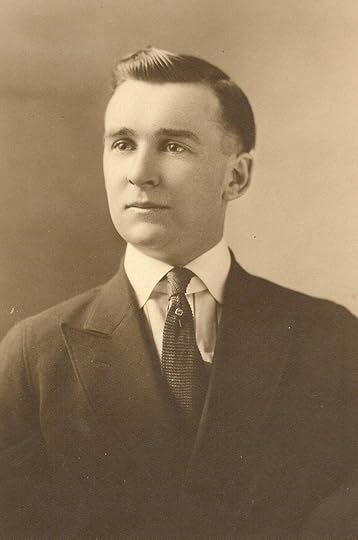 Ignac “Iggy” Rybar was born on September 23, 1926 in Trencin, Slovakia to Jacob Rybar and Amalia Laska. Jacob worked as an “outdoor maintenance man” and Amalia cared for their three children: Ignac, Emil and Lydia.
Ignac “Iggy” Rybar was born on September 23, 1926 in Trencin, Slovakia to Jacob Rybar and Amalia Laska. Jacob worked as an “outdoor maintenance man” and Amalia cared for their three children: Ignac, Emil and Lydia.
Iggy went to the equivalent of elementary school and then attended a trade school to learn to become a mechanic. “Life was very hard” in Slovakia, Iggy says, so he and some friends decided at some point to run off to Germany to try to find a better life. Eventually, Iggy found his way to an American army base and was befriended by some of the soldiers there. He was given a job, and, later, they helped him to immigrate to America, which had always been his ultimate dream.
Iggy made his way to Chicago because he had a friend living in Cicero. He got a job as a mechanic but then found a better job as a bricklayer. His boss, he says, recognized that he was “a hard-working, dependable man,” so he sent him to further schooling to learn how to work with cement. He continued working in construction, getting several promotions along the way, until he retired at age sixty-five. He is extremely proud of the fact that he helped to build both the Eisenhower and the Kennedy expressways.
When the Korean War broke out, Iggy felt very patriotic about his new country and remembered how good the American soldiers had been to him back at the base in Germany, so he attempted to enlist. He was apparently rejected, however, because his English was so poor. It was disappointing to Iggy, as he really wanted to “fight for America,” but he threw himself into his work instead.
Iggy was a member of Mary Queen of Heaven Church in Cicero and was also a member of the Czech Sokol group, which was a gymnastics type of group founded in the Slovakian nations in the 1800’s, which promoted physical well-being as a way to strengthen the body as well as mind. Their motto was “a strong mind in a strong body.” Sokol groups also consisted of lectures, discussions and served as places of cultural unity and connection. Iggy was an enthusiastic member and joined a dancing group within Sokol, which used to perform at various nursing homes, including the Bohemian Home, where he has since become a resident. Iggy says he has always enjoyed all types of music and also likes to read.
Very late in life, Iggy met a woman by the name of Helena, whom he started dating. He says he always wanted to get married but never found the right one until he met Helena. The two of them dated for about five or six years and talked about getting married several times. Helena was always “sickly,” however, so the wedding was always getting put off. Eventually Helena was diagnosed with cancer and passed away. After that, Iggy lost all interest in dating.
Once Iggy retired from working construction, he spent his time reading and “pottering around” his apartment. He was able to live independently until he had one, possibly two, strokes which affected his ability to walk without a walker. The hospital discharged him back to his apartment and arranged for a nurse’s aide to periodically check on him. This set-up worked for awhile, but eventually Iggy began to deteriorate, the care worker reporting that she was routinely finding his apartment and clothes to be filthy and that he had stopped eating properly.
Iggy’s attorney was then somehow alerted to the situation, and he accordingly arranged for Iggy to be admitted to the Bohemian Home. Despite the fact that Iggy spent so much time at this nursing home performing as a dancer with Sokol, he seems to be having a hard time adjusting to his new surroundings. He finds problem after problem to bring to the attention of the staff and seems nervous and agitated most of the time. He is worried that the staff now see him as “a trouble maker” and that they will “kick me out if I’m not careful,” he says.
The staff continues to reassure him that this is not true and attempts to involve in various activities to help him from fixating on small issues. He willingly attends activities, but once there, he spends most of the time telling other residents about his problems and actually becomes more agitated. He says he wishes he could go back to Slovakia and live with his siblings, but he knows this is not really a possibility.
(Originally written: October 1994)
If you liked this true story about the past, check out Michelle’s historical fiction/mystery series, set in the 1930s in Chicago:
The post Proud to Have Helped Build the Eisenhower and the Kennedy Expressways appeared first on Michelle Cox Author.
July 15, 2021
“The Singing Postman”
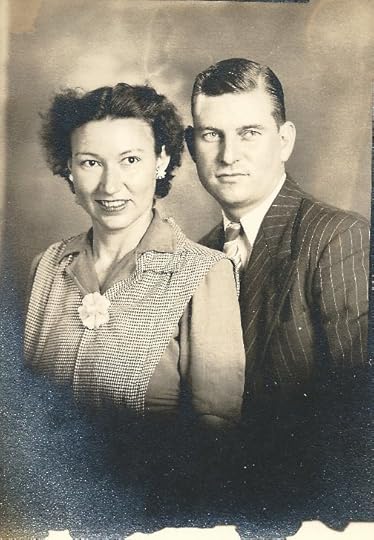 Irving McDonald was born on April 2, 1915 in Chicago to Wesley McDonald and Lucille Rickert. Wesley was born in Pennsylvania but at some point moved to Chicago and began working as a mail carrier. Lucille was a Chicago native and stayed at home with their five children, of whom Irving was the oldest.
Irving McDonald was born on April 2, 1915 in Chicago to Wesley McDonald and Lucille Rickert. Wesley was born in Pennsylvania but at some point moved to Chicago and began working as a mail carrier. Lucille was a Chicago native and stayed at home with their five children, of whom Irving was the oldest.
From a young age, Irving showed a love of music and proved to be very talented in teaching himself to play various instruments. He wanted to pursue a music career, but his parents convinced him that this was not a good idea. Instead, he graduated from Roosevelt High School and took a job as a mail carrier like his father, Wesley, and his younger brother, Ralph. He worked hard at it, however, and was eventually promoted to supervisor.
As a young man, Irving was very social and often went to movies or to dance at the Aragon, and occasionally asked a girl out on a date. He was a very polite, well-spoken young man and very handsome. On one particular night, he happened to be out with a young woman by the name of Bessie and her friend, Eunice, and her date, Bill. Before the evening was over, however, Bill and Eunice got into an argument, so Irving and Bessie offered to take Eunice home. On the way, something sparked between Irving and Eunice, and he later asked her out. They began dating in earnest, then, and eventually married.
Irving and Eunice’s first year of marriage was spent in an apartment on Damen Avenue. Not long after, however, Irving’s father decided to put the family two-flat on Harding Avenue up for sale. This is where Irving and his siblings had grown up, and they were reluctant to see it go. Irving and his brother, Jack, decided to buy it, each of them taking one of the flats. Because of this, Irving and Jack’s children grew up together and are very close, even now.
Irving and Eunice had four children: Tom, Pauline, Marjorie and Edward. Over the years, Eunice worked at night as a key-punch operator at various factories and took care of the kids during the day. Irving and Eunice loved traveling and wanted to share that love with their children, so they took many trips as a family all around the United States, usually in the form of camping. Even after the kids all moved out, Irving and Eunice continued to travel and went to Europe and even enjoyed an Alaskan cruise.
When Irving eventually retired from the post office, he found it hard to sit home and do nothing, so he took a job in the mail room at Walgreens. He was very active in his parish, Our Lady of Mercy, and was a member of the Holy Name Society, who named him ‘”Man of the Year” in 1977. He was also part of the St. Vincent De Paul society and was active leader at the YMCA. “He was an all-around good guy,” his son, Ed, says of him. “He’d do anything for you. Give anyone the shirt off his back.”
Irving had many hobbies, but his real love remained music. Not only could he play the piano, organ, guitar and accordion, but he was a very talented singer. He belonged to various groups over the years, many of which performed at bars, parks, festivals and nursing homes. In fact, back when he was a mail carrier, he had a reputation in the neighborhood of whistling or singing as he delivered mail and was thus unofficially dubbed “the singing postman.”
In the mid-1980s, Eunice was diagnosed with a brain tumor, and Irving cared for her at home, with the help of a nurse, until she passed away in 1986. After Eunice died, Irving continued living alone in the two-flat on Harding and was very independent. He had very few health concerns and had a lot of hobbies and interests and went out to the grocery store every day.
It took everyone by surprise, then, when Irving had a stroke in February of 1994 and was hospitalized for several weeks. He is currently paralyzed on the left side and is mostly unresponsive. His children finally made the decision at the time of his discharge from the hospital to put him in a nursing home on the advice of his doctor. Ironically, his children chose to admit him to the Bohemian Home, which is one of the nursing homes he had often performed at with various singing groups so many years before.
Because he is unresponsive, it is impossible to gauge Irving’s adjustment to this new setting. His children faithfully visit him and seem to be having a hard time accepting their father’s condition and prognosis. They are still hoping he will recover and be able to go home.
(Originally written: April 1994)
If you liked this true story about the past, check out Michelle’s historical fiction/mystery series, set in the 1930s in Chicago:
The post “The Singing Postman” appeared first on Michelle Cox Author.
July 8, 2021
“The Love We Have for Each Other is Secret”
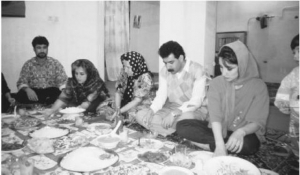 Rahat Karim was born in Jerusalem on October 28, 1939 to Abdul Karim and Basma Nejem. There were four children in the family, 3 boys and one girl. Rahat went to the equivalent of elementary school and learned the basics, which consisted mostly of reading and writing. He then began working in a factory. When he was twenty-five years old, it became time for him to marry, so his father began looking for a bride for him. He approached a man he knew and proposed that Rahat marry his daughter, Halima, who was fifteen. The man took time to consider the match, but he eventually agreed to it.
Rahat Karim was born in Jerusalem on October 28, 1939 to Abdul Karim and Basma Nejem. There were four children in the family, 3 boys and one girl. Rahat went to the equivalent of elementary school and learned the basics, which consisted mostly of reading and writing. He then began working in a factory. When he was twenty-five years old, it became time for him to marry, so his father began looking for a bride for him. He approached a man he knew and proposed that Rahat marry his daughter, Halima, who was fifteen. The man took time to consider the match, but he eventually agreed to it.
Rahat and Halima met each other for the first time at their wedding ceremony. They set up house, then, and by the next year, when Halima turned sixteen, she gave birth to their first child. Over the next couple of years, the fighting between the Palestinians and the Jews grew so intense and dangerous in Jerusalem that Rahat decided to move his family to Jordon, where he again found work in a factory. He was required, however, to serve in the Jordanian Reserves for two years. Halima went on to have seven more children.
In the 1970’s, one of Rahat’s brothers wrote to him from the United States, urging him to come and find a job. Finally, Rahat decided to take a chance and made his way to Chicago, where he worked for a year and half to save enough money to bring Halima and their eight children over. Once in Chicago, Halima had yet another baby at age thirty, which was her last.
The Karim family moved several times to various apartments and finally settled in Lawndale where they became part of an Arabic community. Rahat loved meeting up with friends to discuss many different political and social topics, which could become quite heated at times. He also loved music, drinking coffee, and eating donuts. Rahat, says Halima, was always a hot-tempered type of person. “He was big and strong and always had to be the boss.” When asked about their relationship, Halima says, “The love we have for each other is secret.”
Sadly for the Karim family, Rahat has recently had some sort of stroke and/or seizure. While at home, his hand began to shake and he could not speak, so Halima called for an ambulance. At the hospital, Rahat had eight more seizures and is now is a semi-comatose state. Halima says that the doctors told her he has a rare disease that causes the blood to become too thick and the veins in the brain to shrivel. He is at times able to open his eyes and can only slightly move his right arm.
After two weeks in the hospital, Rahat was discharged to a nursing home, but his prognosis is not clear. His large family is ever present in the nursing home, with someone sitting in his room with him around the clock. They remain very devoted to Rahat and insist on being part of his care, which at times is somewhat disruptive. The family has been reminded many times to follow the facility rules, but they are constantly breaking them. When they are reminded, they claim to have not ever been told or that they forgot. They insist that Rahat is communicating his needs and wishes to them through his eye movements and small hand movements, but the staff have so far not been able to accurately access his cognition.
Halima remains the most often and rarely leaves his side. She seems in denial that this is a permanent placement for Rahat, and talks often of her plans for them once he comes home.
(Originally written: April 1996)
If you liked this true story about the past, check out Michelle’s historical fiction/mystery series, set in the 1930s in Chicago:
The post “The Love We Have for Each Other is Secret” appeared first on Michelle Cox Author.
July 2, 2021
She Met Her Husband at a Ball in Prague
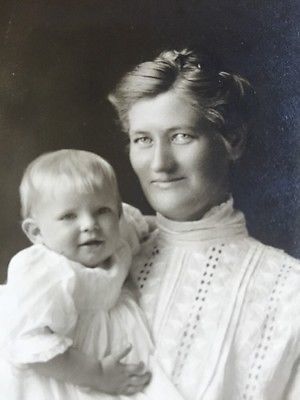
Tereza with Olivie
Tereza Kadlec was born on October 4, 1897 in Olomouc, Moravia to Karel Hruska and Anna Jandacek. Tereza was the second youngest of eight children (5 girls and 3 boys), all of whom lived to be over ninety years old. Karel was a sugar beet farmer, and Anna was a housewife. Both Karel and Anna also lived to be quite old: Karel passing away when he was 95 and Anna at 96.
Tereza went to elementary school, like her siblings, and then went on to a “young ladies finishing school” in Olomouc. At a ball in Prague, she met a man, Marek Kadlec, who was twenty years her senior. They fell in love and married when Tereza turned eighteen.
Tereza and Marek began their married life in Prague. Marek was a professor at the university there and later became a senator in the Czech Republic. They had one child, Olivie, who eventually immigrated to the United States.
In 1965, Marek died of stomach cancer at age eighty-seven. Tereza was left to live alone in communist Prague, so she decided to leave and go live with Olivie in America. Tereza does not explain all the details of how she accomplished this, but she somehow made her way to Oak Park, Il., where Olivie and her husband, John, and three sons lived.
Once here, Tereza was determined not to sit around and was able to get various jobs as either a housekeeper or a nanny for wealthy families on the North Shore. She also helped Olivie to raise the boys. Olivie says that they never felt burdened having Tereza live with them and that they have always enjoyed her company very much.
At age 96, Tereza is remarkably healthy, both physically and mentally. She learned English when she immigrated, but she has since lost much of it. She can still carry on a wonderful conversation with anyone who speaks Czech, however. Recently, Olivie decided to take a two-week trip to Prague to visit old friends and the remaining members of the family still alive there, but she did not feel that her husband, John, could handle caring for Tereza while she was away, especially as his ability to speak Czech is very limited. Instead, she proposed that Tereza go to the Bohemian Home to stay, an idea that Tereza became very excited about. She even went so far as to begin calling it a “mini-vacation” and began to look forward to meeting and talking with new people, as she is at times bored and lonely when the rest of the family is out working.
On move-in day, then, all hopes were high as Olivie carefully got her mother set up in the private room they had requested, having brought many things for her from home. Goodbyes were said, and Tereza seemed very happy. Before long, however, she became disoriented and frightened, repeatedly calling out for Olivie and refusing to eat.
After two days of this, the staff decided to move Olivie to a double room with another Czech lady, which helped Tereza greatly. She is calm and oriented now and beginning to enjoy herself. She spends her days chatting with other Czech ladies and loves the Czech music that is often playing in the background throughout dinner. She is a very sweet, articulate woman who says she used to enjoy sewing, baking and children very much. She would like to have been a teacher, she says, but it wasn’t possible. She loved being a mother to Olivie and is grateful that she got to spend some time with her grandsons before they moved out. She says she likes it here at the facility, but she is looking forward to going home, too. She has asked, however, if she might visit from time to time.
(Originally written: October 1993)
If you liked this true story about the past, check out Michelle’s historical fiction/mystery series, set in the 1930s in Chicago:
The post She Met Her Husband at a Ball in Prague appeared first on Michelle Cox Author.
June 24, 2021
“Always a Gentle Person”
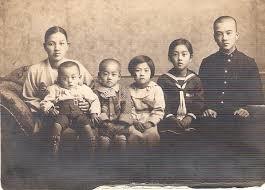
Joo-Won (far right) with some of his siblings
Joo-Won Cho was born on July 12, 1923 in Korea to Kyung Cho and Ha-Yun Kang during the time of the Japanese occupation. Kyung was a businessman in Suncheon, and Ha-Yun cared for their ten children, of which Joo-Won was number five.
Joo-Won went to school in Suncheon and then went to Japan for college, which was apparently the only place to receive higher education at the time. He worked hard at college to learn business, only returning to Korea during his school holidays. In those days, college men were very desirable to the young women in Korea, and Joo-Won, very tall and handsome and sharply dressed in his college uniform, was always popular on his return visits. During one such break, when he was twenty years old, he met a young woman by the name of Ji-Min Mun, who was eighteen. Ji-Min was also attending a university, which was very unusual for women in that day. Joo-Won fell in love with her, and they eventually married.
Shortly after their marriage, Joo-Won joined the army, where he remained for eight years. He rose to the rank of colonel and was second-in-command of the military police. When he was discharged, he took over his father’s business. He and Ji-Min had three children, and Ji-Min, despite having an education, stayed home to care for them. Joo-Won loved exercising and gardening and was a very social person. Ji-Min says she was always proud of her “handsome husband.” Over the years, he and Ji-Min traveled to many countries, including China, Japan and the United States, and even went on a few cruises.
In 1979, one of Joo-Won’s younger brothers who had immigrated to the United States, urged Joo-Won and Ji-Min to also move to the United States so that their children would have a better education. After thinking about it for a long time, Joo-Won and Ji-Min decided to take his advice, and they moved to Chicago. All three of their children were then able to go to high school and college here in the America, and all three became very successful. The oldest son is now living in California, their daughter lives in Texas, and the youngest son lives in Grayslake, Il. Also, they had a nephew in Los Angeles who served as a congressman for nine years.
Joo-Won was always very healthy, and he and Ji-Min enjoyed their retirement until Joo-Won unexpectedly had a stroke in 1994. He then developed a seizure disorder, which caused him to repeatedly fall and injure himself, each time more severely. The family tried to care for him at home, but it eventually proved to be too much, especially with none of the children living close. After much debate and soul-searching, they finally admitted Joo-Won to a nursing home, much to their shame.
Joo-Won spent nearly two years in the nursing home, during which time he did not once complain. His family, however, began to feel that he was not getting enough social interaction and therefore slipping into a depression. So, despite the fact that they did not want him to have to go through the upheaval of another move, they recently decided to transfer him to a different facility with a high number of Korean residents in the hope that he will join in more with people.
So far, Joo-Won seems to be making a relatively smooth transition to the new place and is always calm and agreeable. It is difficult to know what his true mental state is, though, because the staff can only speak to him only through interpreters. His wife, Ji-Min, reports that he is happy, but the staff rarely see him smile. He does occasionally talk with other Korean residents, but only if he is led to them. He seems to have a hard time initiating conversation but will answer questions.
Ji-Min is still upset that she can’t care for him at home, but she visits each day even though it now takes her over an hour to get here. For this reason and because she misses him, she says that she is thinking of admitting herself here so that she can again live with him. “He was always such a calm man,” she says. “He loved his children very much and was always a compromiser. He hated arguing.”
Joo-Won’s children agree with this. “He was always a gentle person,” says their daughter, Duri, “despite being a colonel in the military. Or at least he was at home,” she adds. “He never wanted to talk about his work or what it was like to grow up under the Japanese occupation,” she says. When asked about it, she explains, he would refuse to answer except to say, “Nothing good can come from speaking of those days. That’s in the past.”
(Originally written: June 25, 1996)
If you liked this true story about the past, check out Michelle’s historical fiction/mystery series, set in the 1930s in Chicago:
The post “Always a Gentle Person” appeared first on Michelle Cox Author.
June 17, 2021
“A Wonderful Father”
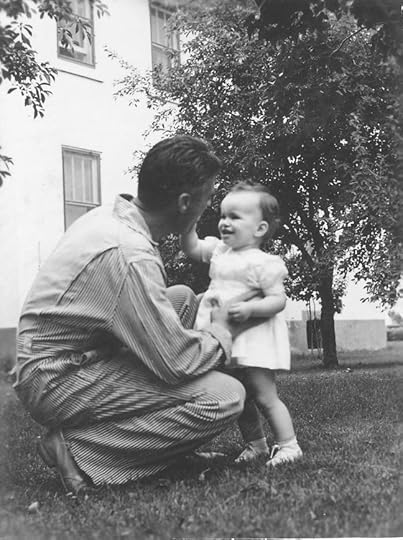
Elmer Densmore with Ida, age 2
Elmer Densmore was born in Chicago on August 13, 1915 to Frederick Densmore and Ann Abrim. Both of Elmer’s parents were also born in Chicago, though Frederick was of Scottish descent and Ann was of German. Frederick was a trolley driver, back when they were still pulled by horses, and Ann was a housewife, caring for their only child, Elmer.
Elmer graduated from high school and then went on to embalming school, though he never actually got a job as an embalmer. He first worked as a carpenter and then as a truck driver for Continental Liquors. As a young man, Elmer did not have many hobbies besides reading and spent most nights at home with his parents.
When he was in his early thirties, though, he was introduced to a young woman by the name of Lois Pollard, a recent divorcee with three small children. Lois’s first husband, Norman Pollard, was a young man she had grown up with in Gary, Indiana. They had three children in three years: Leo, Bernie and Ida. After struggling to find work in Gary, Norman and Lois moved to Chicago for the job prospects. Lois claimed that Norman was an alcoholic, something she apparently had not known before she married him, and decided to divorce him.
Mutual friends introduced Elmer to Lois not long after her divorce, and the two began dating. By the end of 1948, they were engaged and married quickly. Leo had just turned four, Bernie three and Ida two. Bernie relates that none of them have any memory of Norman and have always thought of Elmer as their father. In fact, Elmer attempted more than once to initiate adoption proceedings, but Norman would not agree to it, though he refused to have anything to do with the children or ever see them.
Elmer and Lois began married life in an apartment on Lawrence, but then later move to Draper St. in the Lakeview/DePaul area where they remained for about eight years. From there they moved to a small house on Hamlin, where Elmer has lived ever since. Elmer continued working for Continental Liquors until he retired at age sixty-seven. Early on in their marriage, Elmer apparently brought up the idea of possibly trying to get a job as an embalmer, since he had gone to school for it, but Lois was repulsed by the idea and refused to consider it as an option.
Even as a married man and father, Elmer still did not have many hobbies besides reading. Bernie says that most nights he came home from work and read and wasn’t one to go out drinking “with the guys” after work. He belonged to the Methodist church and went to services every week, but he was not the type, Bernie says, to be involved in any groups or ministries. “He was a wonderful father,” Bernie says, “even though we weren’t really his. You couldn’t have asked for a better dad.”
Eventually, the kids grew up and left home, leaving Elmer and Lois to live a quiet life alone in the house on Hamlin until the late 1980’s when Bernie asked if he could move back. Elmer and Lois were delighted to have him home again, and Bernie has remained there ever since, staying to care for them as they aged. It was fortuitous, Bernie says, because right after he moved in, both of his parents began to go downhill. Elmer went blind in his left eye in 1989, and in 1993, Lois died of cancer and heart problems. After that, Elmer began having problems in his other eye due to edema and glaucoma and started having gastric issues as well. He had trouble eating and became very weak. Finally, Bernie took him to the hospital, where he was also diagnosed with heart problems, dementia, and legal blindness.
It was a tough blow for both of them when Elmer’s doctor advised them to admit Elmer to a nursing home. Elmer and Bernie made the decision together, but both believe that this is just a temporary arrangement until Elmer “gets stronger.” Elmer has so far made a smooth transition, but he remains in his room most of the time unless led out to an activity. He seems shy and unsure of himself unless Bernie accompanies him. Bernie, it seems, is having a harder time accepting his father’s new living situation. He visits daily and sometimes stays for hours, seeming to not want to go back home alone. “My dad is my best friend,” Bernie says. “He was always there for us, and I want to be there for him now.”
(Originally written: August 1994)
If you liked this true story about the past, check out Michelle’s historical fiction/mystery series, set in the 1930s in Chicago:
The post “A Wonderful Father” appeared first on Michelle Cox Author.
June 10, 2021
“This is Not My Mom”
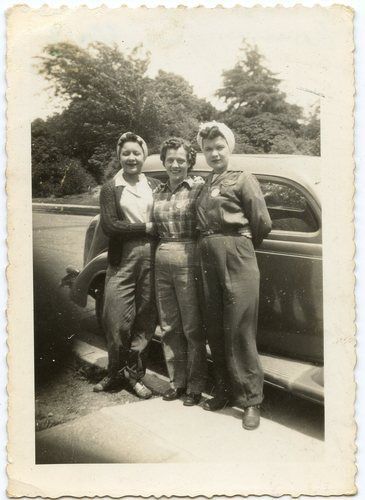
Antonia Pakulski, center
Antonia Pakulski was born on October 10, 1905 in Poland to Bartholomew and Gosia Kowalczyk. Antonia was the youngest of seven children, and when she was just one year old, the family immigrated to Chicago.
Antonia attended school until the eighth grade and then quit to get a job. She first began working as an assembler in a factory and then as a punch press operator. When she was nineteen, she married Bernie Pakulski, who worked at the same factory, though in a different department. Together they had one daughter, Mary. Antonia and Bernie found it hard to make ends meet, so even after Mary was born, Antonia continued working, leaving Mary with her mother, Gosia.
Besides going to see movies, Antonia loved doing anything with her hands: embroidery, sewing, cooking and cleaning. “She was always fidgeting with something,” Mary now says of her mother. “She could never just sit still.” Mary believes this is why Antonia now has a habit of picking at her skin or scabs.
According to Mary, Antonia and Bernie kept mostly to themselves. They didn’t particularly like either side of the family and spent most of their time at home or with a small circle of friends. Mary graduated from high school, but remained at home with her parents, financially contributing to the running of the household, until she left to get married at age thirty-seven. “Everyone assumed I was going to be an old maid,” Mary says, “but I wanted a life of my own. So when I met my future husband, Bill, I decided to accept his proposal to get married. It was hard on Mom and Dad, but I couldn’t help it.”
After Mary left, Antonia and Bernie found they could no longer afford to keep their apartment without Mary’s wages, so they moved into CHA housing. Bernie passed away from emphysema in 1968. After his death, Antonia lived alone in the apartment for twenty-two years until she began to show signs of confusion and dementia, which grew steadily worse as time went on. In the early 1990’s, Mary began going to check on Antonia more frequently.
Mary would often arrive and find Antonia wearing several dresses at one time, and once she found toilet paper in the freezer. Several times she threw her dentures in the garbage, telling Mary that she could easily get a new pair at a dime store. Often she wandered from the apartment, only to be brought back by the police, neighbors, or, once, by two little boys. The last straw for Mary was when she arrived one day to find her mom cooking soda in a pan with a paper towel in it.
With the help of Antonia’s doctor, Mary finally admitted Antonia to a nursing home. She is making a relatively smooth transition, though she is very confused. Mary seems grateful that her mother is now in a safe place, but she grieves for the mother who is no more. “This is not my mom,” she frequently tells the staff. “I wish you could have known her before. She was the sweetest woman, always so grateful for any little thing.” Mary continues to visit on a weekly basis at least, sometimes daily. Antonia willing participates in any activity she is brought to, though she needs assistance. Her favorite activity is listening to music and folding napkins.
(Originally written: May 1995)
If you liked this true story about the past, check out Michelle’s historical fiction/mystery series, set in the 1930s in Chicago:
The post “This is Not My Mom” appeared first on Michelle Cox Author.
June 3, 2021
He Decided to Flee in the Night
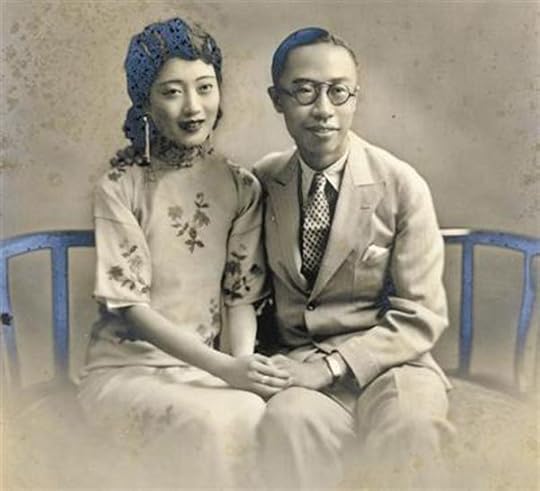
Hyun and Myeong-Suk
Hyun Sang Choe was born on October 17, 1922 in a small village in Korea to Seo-Joon and Young Nari. Hyun was their only child. When Hyum was just a baby, his father died. His mother never remarried and lived alone with Hyun.
Hyun went to school until about the seventh grade and then quit. Right at about that time, Hyun says that many people from the northern part of Korea were moving south and beginning to occupy towns and villages there, taking over everything. Many of the people already living in these villages began to be afraid of the newcomers and started fleeing south in the dead of night, fearing that a war was imminent.
Hyun became convinced that he and his mother should flee as well and began to try to convince her. She refused, however, like so many other people from her generation who refused to leave their homes and property and town. Hyun begged her, saying that bad people and a war were coming, but she remained obstinate.
So, one night, Hyun made the decision to go without her. After the war, the border was sealed, and no calls, mail or visitors were ever allowed back in. Hyun says that he sometimes went and stood at the border where he could look across and see his old town, but he never saw his mother again.
Permanently in the South now, Hyun became a ginseng farmer and eventually went to a “matchmaker” to find a wife. The matchmaker set him up with a young woman by the name of Myeong-Suk Kim, and they married right away. Together they had six girls and one boy. While giving birth to their seventh child, Myeong died.
Hyun grieved for Myeong for two years before he married again. His new wife’s name was Seong Park, and they did not have any children together. Hyun and Seong travelled extensively around Korea and seemed to be genuinely in love. Hyun’s hobbies were singing, movies, chess, and reading. He and Seong were apparently quite content, Hyun still working as a ginseng farmer until 1985, when his oldest daughter, Ji-Yoo, urged them to move to the United States so that Hyun could be closer to his children and grandchildren.
Hyun took time to think about it and, after considering the fact that he was getting a bit too old to farm and that he was worried about the political climate in Korea, decided to take his daughter up on her offer. He and Seong thus immigrated to the United States and initially lived with Ji-Yoo and her family in Philadelphia before they moved to Chicago, where four of his daughters and his son currently live. His sixth daughter was also in Chicago for a time, but after meeting a Korean man here and marrying him, they decided to return to Korea. Hyun rarely saw her, though, as she lived in a different part of Korea from him and Seong.
Now in Chicago, Hyun and Seong began renting an apartment on Sheridan Road and were able to manage well on their own. They joined a Korean protestant church and met many people there. Recently, however, Hyun suffered a stroke. He was hospitalized for a time before being released, but he fell shortly thereafter and broke his hip.
At his doctor’s suggestion, Hyun was admitted to a nursing home to fully recover. Seong visits him daily, sitting with him most of the day, and many of his children and grandchildren visit, too. Both Hyun and Seong believe that he will someday return home. Hyun speaks very little English and is therefore not able to interact with most of the other residents. He is a very sweet man, who seems obliging and content and willingly tells his story through an interpreter. His favorite activity at the home so far is listening to classical music. He does not seem depressed or anxious, especially when Seong is present.
(Originally written: July 1996)
If you liked this true story about the past, check out Michelle’s historical fiction/mystery series, set in the 1930s in Chicago:
The post He Decided to Flee in the Night appeared first on Michelle Cox Author.




